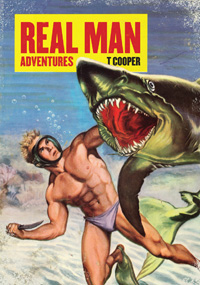Novelist T Cooper’s curious memoir, Real Man Adventures, is divided into forty-eight chapters consisting of short essays, drawings, letters, interviews, six-word stories, and an accompanying CD of twelve mostly original songs, one of which was written and performed by his father. Much of Cooper’s work questions what it means to be a man today and why strict categorization of one’s gender (by, for instance, the Transportation Security Administration) is necessary. The book opens with an epigraph from Ralph Ellison’s Invisible Man: “It goes a long way back, some twenty years. All my life I had been looking for something, and everywhere I turned someone tried to tell me what it was. I accepted their answers too, though they were often in contradiction and even self-contradictory.” The lines refer to the impetus for this book: the fact that T Cooper was not born male. Even before his sexual reassignment surgery, Cooper lived as “a visible man.”
 “I’m not quite one of those ‘born in the wrong body’ types you see on Oprah or The Learning Channel,” he wrote in an unsent letter to his parents. “I actually think I was born in the right body, my body,” he continued. “It’s just a little different, and it doesn’t fit squarely into the gender binary.” Cooper’s chronicle is far from a standard autobiography, and attempting to unpack the entirety of his life story was never his intention. Instead, he interweaves childhood memories with different drafts of the letter to his parents, multiple interviews (with his own family members as well as with, among others, the parent of a transgender friend), assorted lists, opinionated footnotes. All are presented in an array of tones: straightforward, humorous, angry, loving, reflective, grateful, cerebral, and compassionate. His is neither a political book nor a polemic, but a deeply personal, honest, and wildly creative expression of Cooper’s view of himself and of the world in which he lives.
“I’m not quite one of those ‘born in the wrong body’ types you see on Oprah or The Learning Channel,” he wrote in an unsent letter to his parents. “I actually think I was born in the right body, my body,” he continued. “It’s just a little different, and it doesn’t fit squarely into the gender binary.” Cooper’s chronicle is far from a standard autobiography, and attempting to unpack the entirety of his life story was never his intention. Instead, he interweaves childhood memories with different drafts of the letter to his parents, multiple interviews (with his own family members as well as with, among others, the parent of a transgender friend), assorted lists, opinionated footnotes. All are presented in an array of tones: straightforward, humorous, angry, loving, reflective, grateful, cerebral, and compassionate. His is neither a political book nor a polemic, but a deeply personal, honest, and wildly creative expression of Cooper’s view of himself and of the world in which he lives.
Married with two stepchildren, Cooper claims the smartest thing he ever did was ask his wife to marry him, and his inclusion of her writing and their conversations make for some of the most compelling material here. When he asks her to cite five ways in which he is “typically male,” she responds:
1. You are self-involved.
2. You watch TV with your hand down your pants.
3. You never worry about how much you’re eating.
4. You get territorial and jealous.
5. You don’t apologize for yourself.
BONUS: You spit on the sidewalk.
Cooper is the bestselling author of three novels as well as the editor of a nonfiction collection. What he demonstrates in Real Man Adventures is an understanding of the way people construct their psychology from the material of story. He sees that these personal constructions carry a social impact, and the subject into which he delves—what he refers to as his “thing”—isn’t merely timely and provocative; it’s artful. By involving so many people, from his older brother to the musicians and writers who’ve contributed work to the CD, his storytelling ceases to be a private confession from the writer to the reader and becomes a wholly social context. Separate from his journey into manhood, the adventurous aspect of these stories lies in the disparity of their media. Instead of preaching from a soapbox, Cooper has initiated an energetic dialogue between many people, including, he hopes, his readers.
 In her 2010 women’s empowerment book, Birthing Ourselves into Being, writer Baraka Bethany Elihu argues that “heroines have stood out against all odds or have often been the silent and solid protectors within an oppressive system. We’ve got Joan of Arc (who became a ‘man’ in order to serve) and we’ve got Emily Dickenson (who hid out in her father’s home and within her own mind in order to find the personal freedom to create).” Cooper shares vignettes revealing moments when he has felt oppressed, demeaned, violated, teased, or otherwise judged, but the personal freedom Elihu writes about is something he’s found, both in his writing and in his life. He doesn’t care what people do with their bodies, he writes, as long as they’re adults and aren’t hurting anybody. He does take issue with the word “transgender” because the label carries the implication of someone permanently in transition. He is embarrassed by the paradox of his condition, and his frankness helps the reader clearly understand his dilemma, with empathy.
In her 2010 women’s empowerment book, Birthing Ourselves into Being, writer Baraka Bethany Elihu argues that “heroines have stood out against all odds or have often been the silent and solid protectors within an oppressive system. We’ve got Joan of Arc (who became a ‘man’ in order to serve) and we’ve got Emily Dickenson (who hid out in her father’s home and within her own mind in order to find the personal freedom to create).” Cooper shares vignettes revealing moments when he has felt oppressed, demeaned, violated, teased, or otherwise judged, but the personal freedom Elihu writes about is something he’s found, both in his writing and in his life. He doesn’t care what people do with their bodies, he writes, as long as they’re adults and aren’t hurting anybody. He does take issue with the word “transgender” because the label carries the implication of someone permanently in transition. He is embarrassed by the paradox of his condition, and his frankness helps the reader clearly understand his dilemma, with empathy.
Cooper feels fully settled as a man, but he also he sees that everyone is in transition. “That’s what we do as humans: we evolve, constantly,” he writes, and then he quotes Foucault: “I don’t feel that it is necessary to know exactly what I am. The main interest in life and work is to become someone else that you were not in the beginning. ” Nevertheless, Cooper confesses in the following paragraph, sometimes he does still “wonder if and when I’ll ever just be a man in this world.”
Throughout the book, he offers effusive thanks to his wife. At one point, he includes a brief excerpt from an essay she wrote about falling in love with him: “There is this misbegotten notion that transmen and women are about playing dress-up and fooling people. But to be trans is to feel the truth so acutely you can’t fake it. It is to be so consumed with the truth of who you are that you are willing to risk everything to inhabit it. To refuse to be what other people have decided you are—this is an act of courage few individuals dare try. I know I didn’t.”
Again and again, from Cooper and from other voices included here, the reader hears variations of “This is who I am.” These statements aren’t made to attract attention or invoke controversy; they’re acknowledged with emotions running from pride to resignation, even fear and disappointment. The element that least works about Real Man Adventures happens to be the same feature that makes it successful: Cooper covers so much territory, in so many staccato chapters, that it will pose a challenge for readers expecting a straight (no pun intended) memoir. But his decision to throw so much into the text (and music) prohibits boredom and offers something—or some things—that will appeal to everyone. Cooper’s magnetism stems from his lack of self-pity, his talent for laughing at himself, and his combination of humility and confidence. His life isn’t only visible; it explodes with color.
T Cooper will read from and discuss Real Man Adventures at Parnassus Books in Nashville on January 17 at 6:30 p.m. Knoxville resident Peggy Hambright (formerly of The JudyBats) will perform songs she wrote to coincide with the book’s themes. On March 11, Cooper will also read at the University of Tennessee’s Hodges Library. Both events are free and open to the public.
Tagged: Nonfiction





